Key:bollard
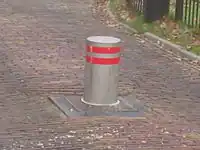 |
| Description |
|---|
| Finer-grained classification of a bollard. |
| Group: barriers |
| Used on these elements |
| Requires |
| Status: de facto |
| Tools for this tag |
|
The key =* describes a bollard in greater detail, and must be used in combination with the tag barrier=bollard.
Standard values used for this key see below. To see other values that are already used take a look at the Taginfo page.
To describe the material property of a bollard use material=* instead of using the bollard key to describe the material.
Common values
| Tag | Description | Example |
|---|---|---|
=rising
|
An automatic rising (and falling) bollard which controls vehicle access based on a timer, electronic systems, manual controls, or a payment system.
This brief description intentionally doesn't say how rising bollards are controlled, or whether they're generally to be found raised or lowered, but you might like to consider using |

|
=removable
|
A bollard which can be pulled out of the ground and removed from its location to allow access, often only by the person with the key. Normally in place, and not generally passable. | 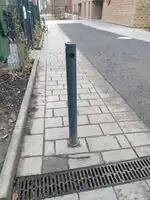
|
=fixed
|
A bollard which cannot be fully removed without destroying it or at least causing severe damage to it. If a bollard has some sort of lock to remove/lower/fold it, it's not fixed. | 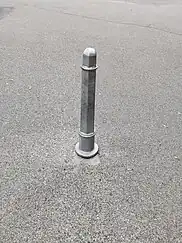
|
=foldable
|
A bollard which can be rotated so it lays on the ground and vehicles are then able to pass it. Some kind of key or wrench might be needed. This bollard can easily be moved back to its previous position with no damage left. | 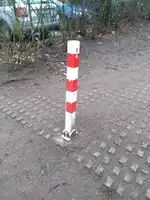
|
=flexible
|
A bollard made of a soft material which makes it able to bend the bollard. This can be e.g. found at parking lots. The bollard would probably leave no damage on vehicles colliding with it. | 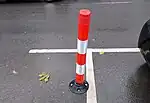
|
=low
|
Low-profile bollards are a special type of fixed bollards that stop personal cars, while still allowing emergency vehicles (like fire brigade trucks) to pass over it. | 
|
=sliding
|
An automatic bollard which controls vehicle access based on a timer, electronic systems, manual controls, or a payment system.
| |
| * | Consult Taginfo and the mailinglist before making new values up. |
access=* and other explicit access tags may be useful for bollard of not entirely certain or unusual access. Especially for =rising.
Possible Tagging Mistakes
See also
cycle_barrier=*- Classification of types / designs of cycle barriers